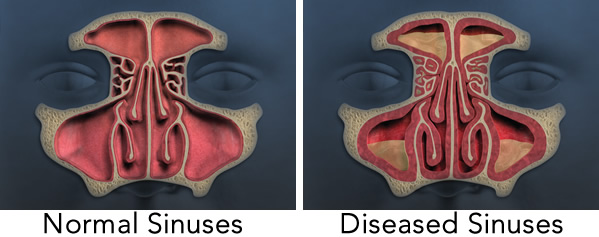
1 in 7 adults are affected by Chronic Sinusitis each year, making it one of the most common health conditions in America.
The sinuses are air-filled cavities located within the bones around the nose and eyes that allow for air flow and drainage. In Chronic Sinusitis, the sinus linings become swollen (inflamed), preventing natural drainage of the pathways, leading to chronic infections and nasal blockage.

Patients with Chronic Sinusitis suffer from symptoms such as:
Medications often prescribed for Chronic Sinusitis patients:
If patients’ symptoms continue even with medications, sinus surgery may be an option. During the surgery, the Ear, Nose and Throat (ENT) surgeon will enter the sinuses through the nostrils to open blocked sinus pathways and clean out infection. Opening the inflamed sinus pathways allows the sinuses to drain better and improves air flow.
While surgery provides benefit to many patients, inflammation and scarring can take place even in the first 30 days, diminishing the impact of surgery or causing symptoms to return. There is now a new technology that is placed at the time of surgery and clinically proven to reduce inflammation and scarring. Read on to learn more about PROPEL®.
When placed in the sinus following surgery, PROPEL decreases scarring and inflammation, reducing the need for additional surgical procedures and oral steroids that can have serious side effects.
The spring-like PROPEL implant props open the ethmoid sinus to maintain the surgical opening, delivers an anti-inflammatory medication directly to the sinus lining, and then dissolves, avoiding the need for removal.
After surgery, your care may include nasal irrigation (e.g Neilmed Sinus Rinse ™, LAVI Sinus Wash), oral antibiotics and pain medicine. Take all of your medication as directed for the best outcomes.
Additionally, you can expect some bleeding, drainage and discomfort (e.g. pain, headaches). Sleeping with your head elevated 30 degrees is helpful to reduce sinus swelling and bleeding. Try your best not to blow your nose, bend over, lift heavy objects or physically exert yourself for 1-2 weeks after surgery. If you have to sneeze or cough, keep your mouth open and avoid pinching your nose.